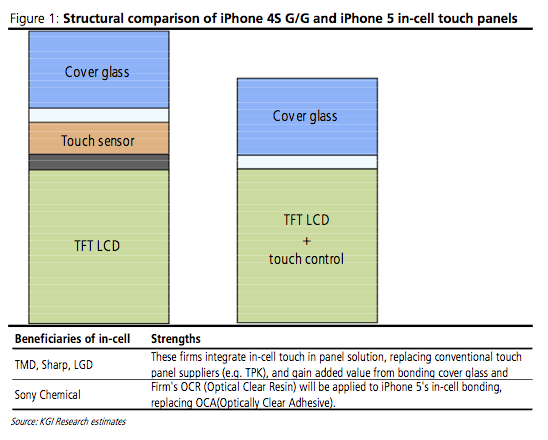Low yield rates for in-cell touchscreens may affect Apple's next iPhone
Last updated
To encourage Japan Display, LG Display and Sharp to produce more in-cell touch panels, Apple has reportedly offered subsidies as high as $10 to $15 per panel, according to the hit-or-miss Taiwanese industry publication DigiTimes. With yield rates too low, display makers are allegedly struggling to make a profit on the next-generation display technology.
Citing rumors in the touch-panel industry, Tuesday's report said the poor yield rates are "likely to cause certain disruption to Apple's shipping schedule for the new iPhone."
Japan Display reportedly has the highest yield rate of Apple's in-cell touch panel partners. But its yield rate is just 50 percent, the report said.
"Due to the poor yield rates, combined shipments of in-cell tocuh panels for the upcoming iPhone are estimated at only 4-5 million units in July — far below Apple's target of 20-25 million for all of the third quarter, the rumors pointed out," authors Siu Han and Jessie Shen wrote.
Market watchers reportedly believe that Apple could be forced to approach TPK, the major panel supplier for previous iPhone models, to build more traditional touch panels using the full lamination process. However, DigiTimes Research analyst Luke Liun believes it is unlikely Apple would revert to previous-generation touchscreen technology, as such a move would probably delay the launch of the next iPhone.
Numerous reports have indicated that Apple plans to feature in-cell touchscreen technology on its next-generation iPhone. The new in-cell screens integrate the touch sensors into the LCD itself, allowing the screen to be even thinner by eliminating the need for a separate touchscreen layer.
DigiTimes is notorious for being the source of unreliable rumors about upcoming products, particularly with respect to Apple. However, the publication was the first to report in April that Apple planned to adopt in-cell touch panels for its 2012 iPhone, a detail that was later corroborated by analyst Ming-Chi Kuo of KGI Securities, as well as The Wall Street Journal.
More evidence of Apple's switch to in-cell touch panels also came earlier this month, when touch panel supplier Wintek announced its June sales were down an unusually high 33.6 percent month over month. That was interpreted by analyst Brian White with Topeka Capital Markets as a sign that the company may have lost out on key orders for Apple's next-generation iPhone.
 Sam Oliver
Sam Oliver














 Amber Neely
Amber Neely
 Thomas Sibilly
Thomas Sibilly
 AppleInsider Staff
AppleInsider Staff
 William Gallagher
William Gallagher
 Malcolm Owen
Malcolm Owen
 Christine McKee
Christine McKee










41 Comments
Sounds like another attempt to manipulate AAPL by putting out negative rumors. Do serious investors take rumors seriously? Or is this stuff just for fanboys and iHaters to argue about?
How much thinner are we talking about? I personally don't like "too" thin cell phones, that is why I carry my Galaxy S II in a bumper case. Without it feels too light and too thin.
Think of the thinner display as a trade-off for more battery space.
You're right that there is a minimal "thinness" which will still feel correct in your hand, not break in your pocket, etc.
We hear this every single time a new iPhone or iPad is about to be announced. I ageee - it probably is an attempt at manipulation just before the price booms in order to maximize profit for "analysts".